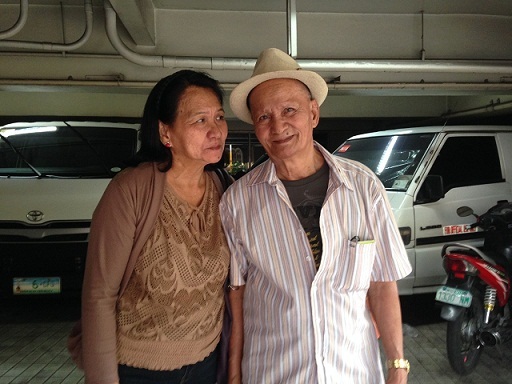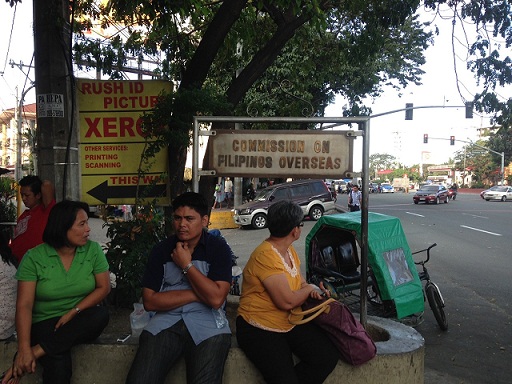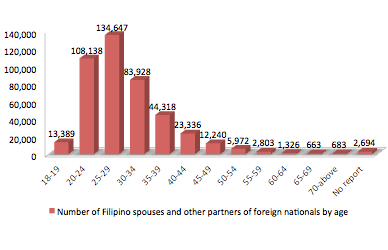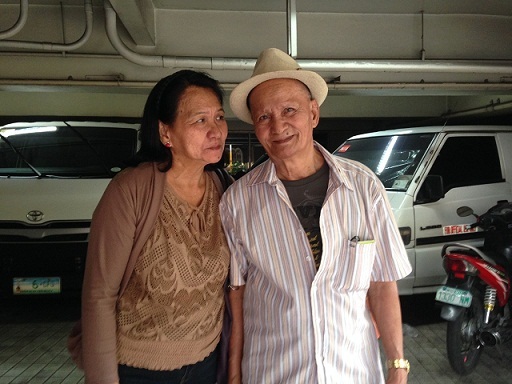
By ARTHA KIRA PAREDES
THE story of Violeta and Gerardo proves two things: It’s never too late to fall in love again and love hurdles immigration barriers.
After the death of her first husband, 60-year-old Violeta Timbang Tolentino married 80-year-old widower Gerardo, an American citizen, August 7 last year in Pampanga.
The couple has known each other for years, Violeta’s aunt being Gerardo’s late wife. They saw each other again two years ago and from there the rest is history as the old cliché goes.
While processing their papers, Violeta who is from Pampanga, is learning to adjust to her husband whom she describes as “more American now.” Gerardo has resided in the States for the last 20 years and he lives independently from his 11 children.
“More American” also means transparency and strict budgeting in their finances. “Nagkukusa naman siya (sa pagbibigay ng pera) pero dapat alam niya kung saan ito napupunta (I don’t need to ask for money but he needs to know how I spend it), Violeta who was interviewed at the Commission on Filipino Overseas (CFO) said.
She was at the CFO to attend the four-hour guidance and counseling session, which every foreign spouse and fiancé/fiancée must undergo before leaving the country. The Department of Foreign Affairs (DFA) also requires the guidance and counseling certificates for wives who want to renew their passports under their foreign husband’s name.

CFO, according to its website, is the country’s “premier institution in promoting policies, programs and projects with Migration and Development as framework for the strengthening and empowerment of the community of Filipino overseas.”
DFA Department Orders 10-97 and 28-94 require the guidance and counseling so that partners and spouses can “make informed decisions and prepare them for the realities of cross-cultural marriages.”
There are two counseling sessions everyday for US spouses and partners. There are no reservations so participants queue as early as five in the morning to get one of the fifteen slots per session.
From 1989 to 2012, CFO records show that there were 183,918 Filipino partners and spouses of American citizens. This comprises 42.36 of the total percentage. Data also show that USA is the top destination of spouses and partners followed by Japan at 26.57 percent the Australia at 7.90 percent.
Statistics from the same years also show that those in Violeta’s age bracket (60-64) comprise 0.31 percent of Filipinos

with foreign spouses and partners. Those aged between 25 and 29 topped the list at 31.01 percent.
To Violeta, the CFO counseling, which was about cross-cultural relationships/marriages was very helpful in preparing her for a life in the States.
That day, CFO Emigrant Services Officer Gregorio Jabal, Jr who facilitated the afternoon counseling explained that it was for participants to better grasp the individual and cultural differences that cause conflict.
Culture, he explained is the “way of life” that each has been accustomed.
The first part was a group session where Jabal explained the different aspects of marriage that participants need to work out with their spouses.
This included finances from budget priorities to bills, insurances, everyday expenses on food and other necessities and whether you will be “given allowance to spend for your needs.”
Jabal emphasized that the “hard-earned money” should not be “siphoned” out to family members in the Philippines. Sending financial support could be an area of concern, he said.
It is also important to discuss employment, work arrangements, sharing in the household expenses and sending your salary to your family, he said. Partners also have to talk about the number of children they want, birth spacing and support in children from previous relationships, if there are.
Jabal also gave tips on communicating such as being direct to the point when something is needed and becoming assertive in clarifying.
“Love is the primary motive of marriage,” Jabal said towards the end of the group counseling adding that marriage is both “individual and mutual effort.”
Practical tips on travel documents to remember, travel tax and Philippine Consulate addresses where given before the counselor conducted a short interview with the participants before they were given their certificates.
Violeta said love was the reason she married Geardo and not just his offer to take her to the US so that she can help her four children.
“Aanhin ang pera kung hindi nagmamahalan (what good is having money if you don’t love each other)?” she said.
Her husband, who accompanied her and waited for her outside the CFO building has been extending his stay here for the last months to help her process all the requirements.
Going through the CFO counseling is just one of the requirements in immigrating as a spouse or partner to the US. Other requirements after the petition is approved include documents from the National Statistics Office (marriage certificates for spouses and certificate of no marriage for other partners), National Bureau of Investigation clearance and vaccinations. The petitioned must also undergo a medical examination a week before the interview.
